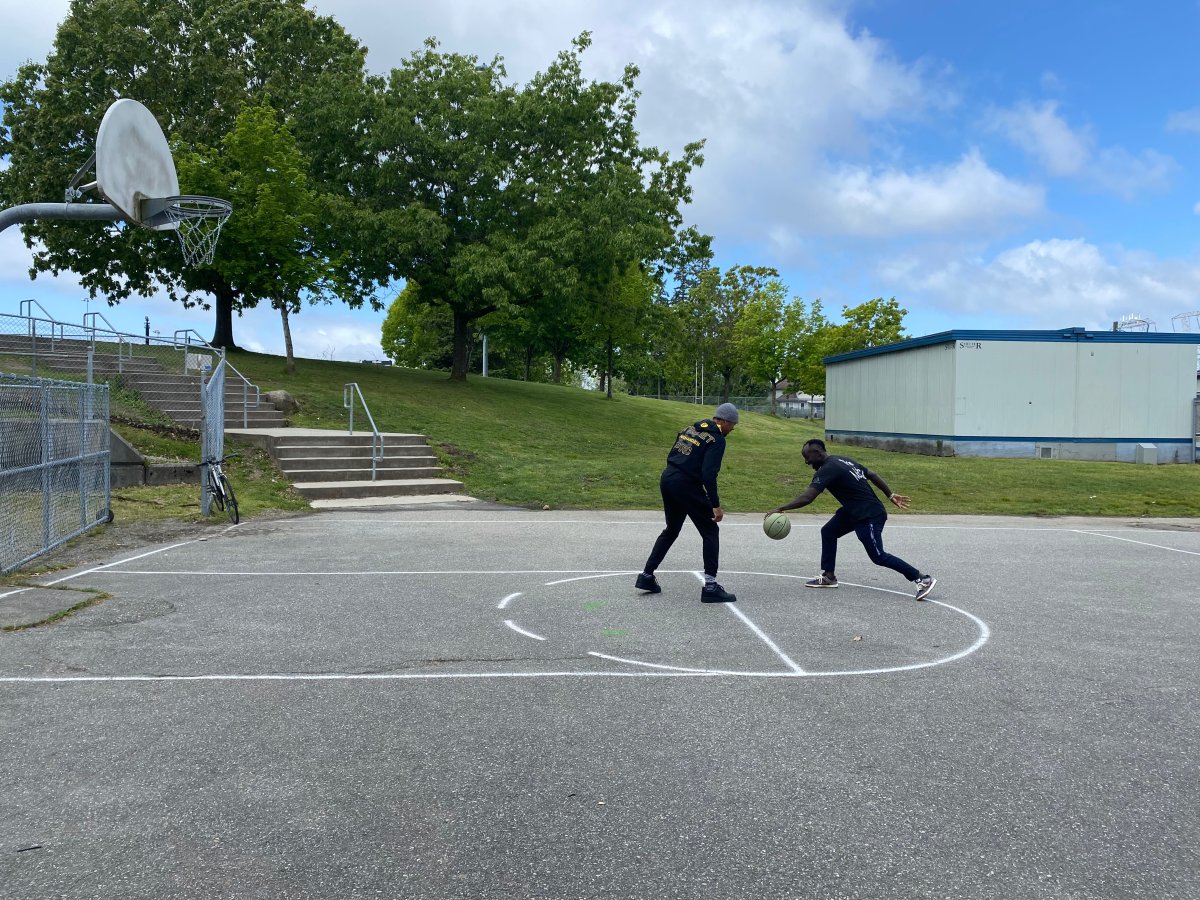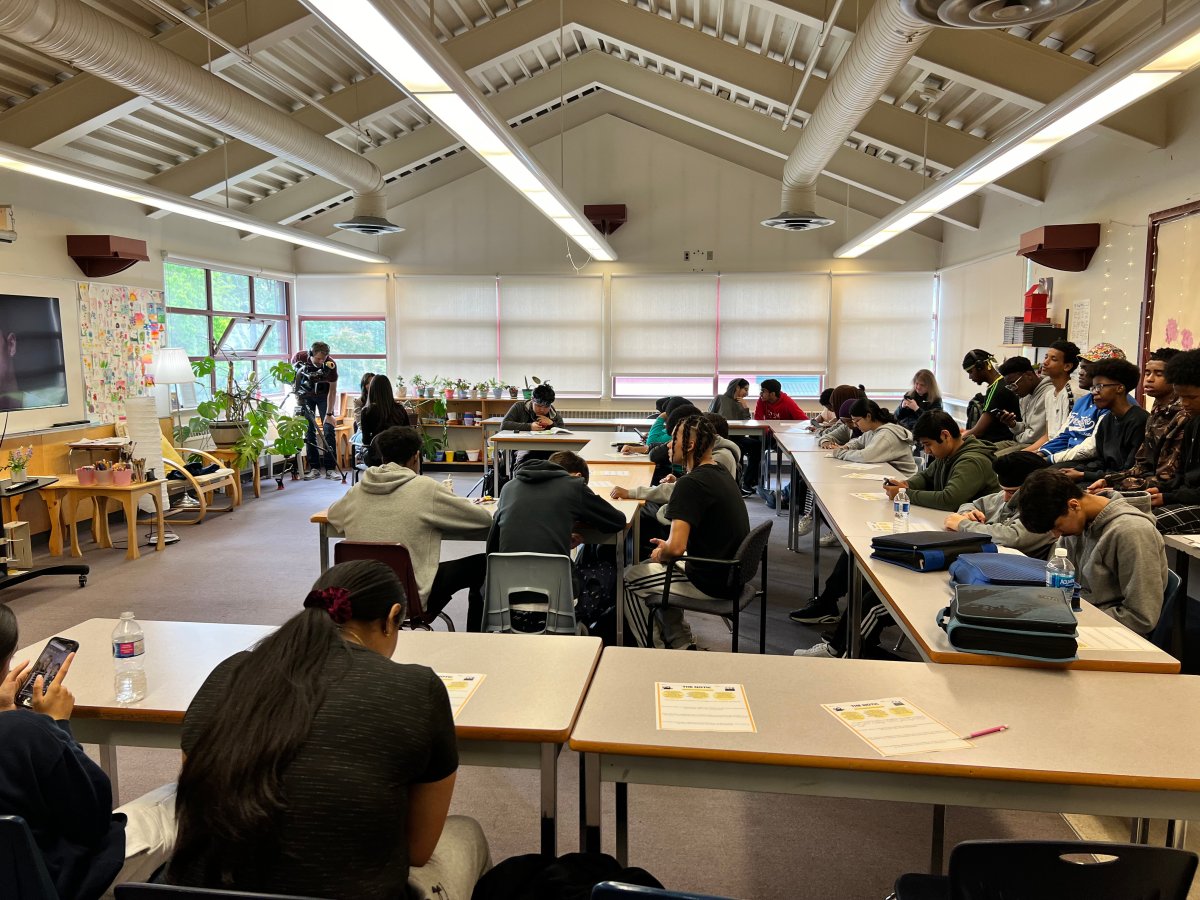In Surrey, British Columbia, the echoes of dribbles and the swish of the net reverberate not just on the basketball court, but also in high school classrooms.

“If you believe in yourself, you don’t know where it could take you,” Joel Haywood King Handles, the School of Handles Basketball Academy CEO and ex-professional basketball player told Global News.
King Handles and Johnny Blaze, as they’re affectionately known, were members of the Notic streetball crew in Vancouver.
It was comprised of mostly Black immigrants.
The team’s journey is the subject of a documentary called Handle with Care: The Legend of the Notic Streetball Crew, which was recently introduced into classrooms at Tamanawis Secondary School, with hopes of expanding access for educators across the Surrey School District.
“It’s a powerful movie. It’s about more than basketball, it’s about brotherhood. It’s about relationships. It’s about community coming together and trying to find ourselves in that, in that new world,” Jonathan Nkada Mubanda Johnny Blaze told Global News.

Their rise to fame began on the courts, where they found solace and purpose in the game amidst the challenges of assimilation and discrimination faced as young immigrants.

Get breaking National news
Their flashy style of play and unyielding spirit captivated audiences, bringing them global fame as teenagers. Recognition came when they showcased their skills at a Vancouver street ball tournament called Hoop It Up in 2000 and 2001, igniting the crowd with their moves. They would go on to be featured in international magazines and inspired teams worldwide.
“Going to Japan, China and Asia, it’s totally different than Vancouver… Nobody played like that in Vancouver, they kind of looked at you weird like ,that’s not accepted here,” Haywood said during an interview featured in the documentary.
“My coach told me ‘don’t play this jungle ball.’ So, me hearing that it’s like you don’t want me to play like Black people?””
Inside the classroom, the film has become an invaluable teaching tool, sparking discussions on topics like racism and the immigrant experience, according to high school teacher, Mariam Hazhir.
She highlights how basketball serves as a backdrop for deeper conversations.
“Basketball just ends up being the medium for us to talk about so many other things like racism. There’s addiction in there. It’s about creativity. It’s about self-expression, there’s the immigrant experience,” Hazhir, who is also the school’s Indigenous Department head, said.
Hazhir said many of the students see themselves in Haywood and Mubanda, who, as mentors, work with at-risk youth facing similar challenges to what they faced as teens.
“Relationships equals prevention, right? So if I have relationships with these kids, they come up to me, they trust me, tell me what’s going on,” Mubanda said.

Mubanda added he has seen the transformative power of mentorship firsthand and uses his experience to shape how he works with students.
“I had a coach, a female basketball coach, when I was younger that helped me and my brother out immensely. And, she’s the one who hired me to do this job,” he said.
One of his former students, Harpo Mander, who graduated from the school in 2014 said the school liaisons, like Mubanda, known by many students as ‘Johnny,’ had a profound impact on her life and the lives of other students she knows.
“He really broke down the strict, rigid boundaries between this adult authority figure and the student figure and so I think the students felt really understood by Johnny and they didn’t want to let him down because he held so much space for them in their navigation of their identity and I think it, it was also because Johnny was really relatable to them,” Mander told Global News.
Another former student, who graduated from the school in 2011, said his presence helped students steer clear of a dangerous path.
“Because we were exposed to so many high-risk situations, and where we had literally classmates involved in trafficking drugs and other things for organizations… to see somebody who was actually someone you could look up to but they were actually preaching positive lifestyle so it was nice to have that,” former Tamanawis Secondary School student Gagan Gill said.
Mubanda said they hope their story continues to resonate, serving as a reminder of the enduring power of community and connection.










Comments